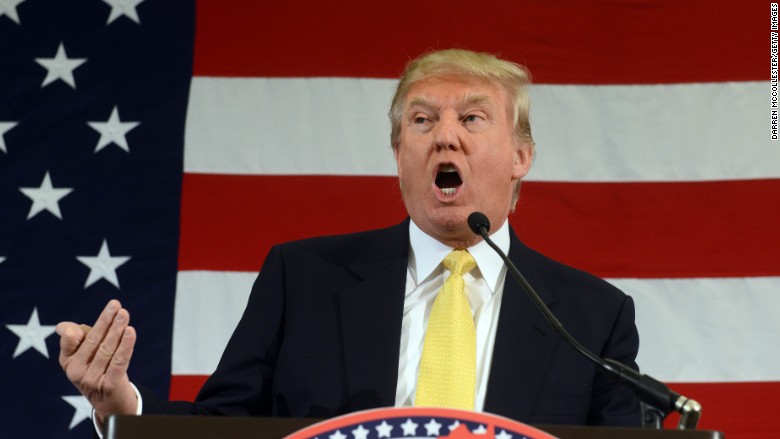Trump, You Can’t Just Say That About Someone!

In the beginning of the semester, when I was still getting acquainted to the election and its candidates, when I still considered Donald Trump to be a novelty rather than a menace, I was bored and found a YouTube clip titled something like, “Best Trump Moments of his Campaign!” It was around 20 minutes in length, and I ended up watching the whole thing – not because I was actually that bored, but because I was entertained. I thought it was hilarious, and started laughing out loud at several points. Afterwards, however, I was a little taken aback. The things Trump said were at the very least controversial, and for the most part blatantly offensive. Not only that, but he said these things at rallies, debates, talk shows – spaces where humor, or laughter even, is not typically present. So why was I laughing? The things that he said were so ridiculous, so out of character for these events, that my response was laughter rather than outrage. It was funny.
According to Joshua Gunn in his essay titled On Speech and Public Release, this makes perfect sense. Gunn uses the example of the deli scene from the movie When Harry Met Sally to show that a breach in what he calls the “public/private distinction” can be funny. Sally screams orgasmically, an obviously private expression, but does it in a public New York deli. Gunn describes this as a type of “threshold crossing.” Once the threshold is crossed, the response of the audience, in this case, is laughter.
Gunn also remarks that currently our understanding of the public/private distinction seems to be “rapidly transforming and continually under assault”; that it “is ceaselessly asserted anew at and in different locations and context.” Based on Gunn’s ideas, it seems that Donald Trump has made its newest location the election of the President of the United States. However, this isn’t actually new. Presidential candidate Howard Dean broke the public/private threshold in his infamous “I Have a Scream Speech” in 2004. The difference here is that Dean’s career immediately ended due to him crossing this threshold, whereas Trump is currently the President of the United States. So why is this the case?
Stand up comedy is a medium in which Gunn’s public/private threshold is crossed quite frequently. Typically a person standing on a stage with a microphone will speak in a professional manner. Maybe they are a professor or a visiting lecturer, a politician or the principal of your high school, but in any case, they will most likely not get up on stage and talk about a sexual encounter with four other participants, as Amy Schumer does in the “Just for Laughs” festival in Montreal, or how their friend tried to race the police while highly intoxicated, as Dave Chappelle does in his comedy show “Killing Them Softly.”
http://www.youtube.com/watch?v=JJ3dk6KAvQM
This specific area of public/private crossing doesn’t just allow some flexibility in the rhetoric and speech topics of the comedian, but if done correctly can allow for extremely racist or sexist language to not only be accepted, but be egged on and met with laughter. Immediately after entering the stage at his “Live at Beacon Theater” show, Louis CK tells the audience to turn off their cell phones, not to take pictures, and also “No Jews… Jews aren’t allowed. If you’re Jewish, this is a good time to go. If you see someone kinda Jew-y lookin’, tell an usher and they will [escort them out].” Comedian Dave Chappelle, remarking on R. Kelly’s alleged urolagnia, says “you guys are confusing the issue. While you guys are busy worrying about whether R. Kelly even peed on this girl or not, you’re not asking yourself the real question, that America needs to decide once and for all, and that question is: how old is 15 really?” These comments, in context, were of course met with rapturous laughter from their respective audiences.
http://www.youtube.com/watch?v=Iod2tfiL_ZM
In the first Republican Presidential primary debate, when asked to explain himself for calling women fat pigs, dogs, and slobs, Donald Trump retorts, “only Rosie O’Donnell.” The insult is welcomed with laughs and applause from the audience that attended the debate, a response that eerily resembles that of an audience at a comedy club. Even the host of the debate, Megyn Kelly, cannot help but hold back a smile. Similarly, in the second Presidential debate, after Hillary Clinton remarked that “it’s just awfully good that someone with the temperament of Donald Trump is not in charge of the law in our country,” Trump immediately responded, “because you’d be in jail,” a comment that received a similar reaction from an audience that had pledged to stay silent. Even Bill Burr, a professional stand up comedian, has said in his podcast that Trump has “great one liners” and that he is “hilarious – he kills.”
Donald Trump has said many controversial and highly offensive things while running for the highest office in the United States, and yet has gotten relatively little flak for them. This is certainly partly due to the fact that many of his constituents agree with his rhetoric and values. However, another reason may be that his rhetoric is so unpolitically correct, so ineloquent, and so absolutely ridiculous in nature, that he crosses the public/private threshold that Gunn describes in a way that allows many of his voters to brush off his comments just as they would if a comedian in a comedy club had said them; that rhetorically, Donald Trump presents himself not as a politician, but more as a stand up comedian.
In response to being asked about Rosie O’Donnell making fun of him on “Late Night with David Letterman,” Trump says, “I’ve known Rosie for a long time, you know – I’ve always felt that she’s a degenerate…” A comment to which Letterman laughs and then replies “Wait a minute. You can’t say that. You can’t just say she’s a degenerate.”
Yes he can.